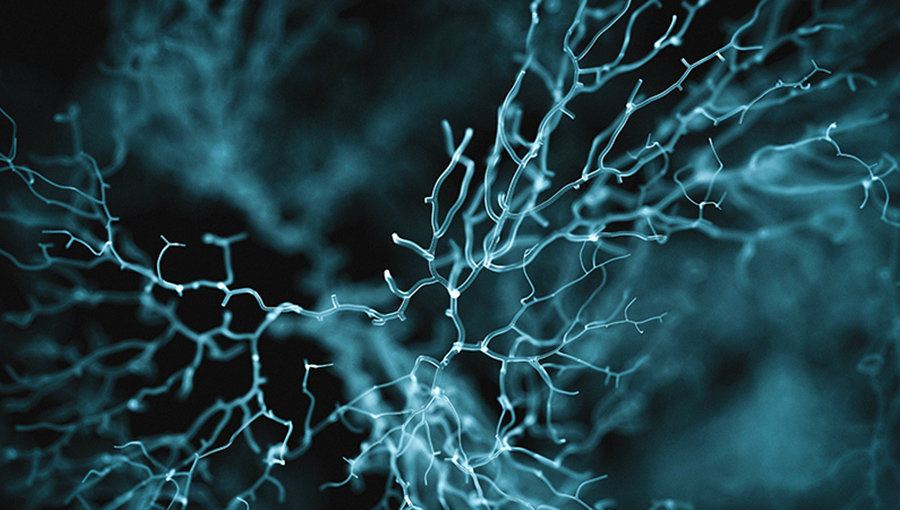Interested in the Workings of the Brain? There's an Online Certificate for That.
The College of Liberal & Professional Studies provides a new opportunity to study neuroscience.
“Almost everyone is curious about how their brain works,” says Loretta M. Flanagan-Cato, Associate Professor of Psychology and an instructor in the College of Liberal & Professional Studies (LPS). Perhaps that’s why the new LPS Online Certificate in Neuroscience had no trouble enrolling students for the certificate’s introductory course, Neuroscience 100. The online survey class on the structure and function of the nervous system launched this fall with students joining from as far away as Europe and Asia.
Damian Pang, based in Hong Kong, enrolled in Neuroscience 100 because of his interest in consciousness research, which was developed during his graduate studies in psychology. “Psychology taught me a lot about the behavioral aspects of the mind but I was lacking a deeper understanding of the underlying biological processes. During my graduate studies, I conducted research on conscious and unconscious perception. I was really fascinated by this because there are still so many unknowns. I would love to conduct further research on this topic in the future,” he says.
The LPS Online Certificate fit perfectly into Pang’s busy adult life. “I was really excited to find the neuroscience program offered by Penn,” he says. “The asynchronous online format allows me to take part in the course while living overseas, having a young family, and working full-time. I am planning to complete the whole certificate.”
Penn LPS Online offers credit-bearing courses, certificates, and even a bachelor's degree (BAAS) for adult learners, with a focus on accessibility and flexibility. The Penn LPS Online Certificate in Neuroscience, one of nine certificates offered by Penn LPS Online, is designed to guide adult professionals through the foundations of the neuroscience field.
Most Neuroscience Certificate students are working professionals seeking an Ivy League educational experience with a more flexible schedule, but beyond that, their stories are diverse. “The students in the neuroscience certificate come from a broad variety of backgrounds and are attracted to it for different reasons,” explains Jaime Kelly, LPS Director of Certificate and Non-Degree Programs. “Students range in age from 21 to 66, with the average age approximately 30. They come from all stages of their careers—from entry-level to seasoned professional—and have backgrounds that include nursing, healthcare, research, psychology, social psychology, and pharmaceuticals. Some students have not yet earned their bachelor’s degrees and others have undergraduate or graduate degrees. We also have a few students who are preparing for medical school and Ph.D. programs.”
Students earn a Neuroscience Certificate by completing Neuroscience 100 and three additional courses in more specialized subjects like the Neuroscience of Music, Behavioral Neuroscience, Autonomic Pharmacology, Psychopharmacology, or Flanagan-Cato’s class: Hormones, Brain, and Behavior. Students who complete the online certificate may pursue an advanced certificate by adding two additional neuroscience courses.
While Flanagan-Cato knows that many people will take Hormones, Brain, and Behavior for professional reasons, she imagines others may take it because of a deep curiosity to understand themselves or loved ones.
She says, “Hormones definitely affect the things we do on an everyday basis and they affect the people around us. It’s natural to be curious about why some people do this while others do that. I imagine some will take my class simply because they want to understand human behavior—their own and those around them—better.”
In only eight weeks, Flanagan-Cato’s class covers three major areas in which hormones affect the brain and behavior. “The first part of my class deals with sex hormones: How do we get differences in the brain by sex and how do they affect things like our social behaviors? The middle segment has to do with homeostasis: How do hormone systems help keep your body in a steady state to maintain body weight and fluid balance? Then, the third part has to do with stress regulation and how our bodies cope with stressors and how they can, in extreme situations, lead to different kinds of mental illness. For all three of those components, we look at clinical aspects as well.”
Flanagan-Cato stresses that all of the classes within the LPS Online Certificate in Neuroscience are rigorous and challenging, but equally rewarding. That Penn standard of rigor is evidenced by a mandatory learning assessment module that students must take before being admitted into Neuroscience 100. The tool is designed to assess baseline knowledge of biology, chemistry, and physics, as well as provide resources and materials to help incoming students learn key concepts so they don’t enter behind or struggle with the content.
“We wanted to make sure that Penn LPS Online students were prepared because Introduction to Neuroscience is not watered down; it is a full Penn class. Normally we would teach that material in 15 weeks—Penn LPS Online students get it in eight weeks,” says Jennifer Heerding, an instructor for the certificate and Associate Director for the interdisciplinary Biological Basis of Behavior program.
Heerding adds, “It’s an intensive learning experience, so students who want to succeed are going to have to be dedicated.”



